#non-disordered system
Explore tagged Tumblr posts
Text
please be normal abt endogenic systems and polyfrag systems and fictive heavy systems and systems w/o fictives and non-disordered systems etc etc etc. I’m tired
#endogenic#endo Safe#pro endo#usually I’m like “both sides of syscourse can interact” but I. Don’t think they should for this one#polyfrag#polyfragmented#polyfrag system#fictive heavy system#fictive heavy#non-disordered system
496 notes
·
View notes
Text
Non-disordered plurality vs. Endogenic plurality: what’s the difference? (FAQ system edition)
What is plurality?
in its simplest form (it’s more complex then this, but this is at its simplest) the experience of multiple beings within one body. The most main stream form that gets talked about is DID, but there is many other forms of plurality. Within the mental health field, systems may also be diagnosed with OSDD-1, UDD, P-DID, (when it comes to labels for plurality at least, misdiagnosis is unfortunately very common as well) typically these get associated with traumagenic plurality, but this isn’t always the case since they are ultimately labels to help categorize plurality in a medical sense. Also not every system falls under these categories!
What’s endogenic plurality?
Endogenic plurality is typically a system who identifies that the system they are apart of was not formed from trauma. This isn’t always the case though! Systems can be Endogenic and traumagenic at the same time. Often times this gets called Multigenic, Mixed Origin, and/or Traumaendo. Also while some systems may identify as fully endogenic, this does not mean they don’t have trauma.
What’s traumagenic?
Traumagenic is a system formed from trauma, it is often associated with childhood trauma, but this isn’t always the case. Once again, traumagenic systems can be endogenic at the same time!
What’s “disordered plurality”?
All this term means is that the system in question deals with significant distress from plurality. This can be caused by amnesia, mental illness, society, not being used to being plural, and many, many other factors. Non-disordered means the person is not dealing with significant distress from the fact they are plural.
So what’s the difference?
Anyone can feel distress from being plural. A endogenic system may be considered a disordered system for many reasons, like maybe they are struggling to manage the fact they are plural along with depression, or they feel a lot of internalized shame and fear about it.
Non-disordered plurality just means the system is not in significant distress from being plural. This can range from a system functioning perfectly fine, to healing trauma, and healing amnesia barriers enough to function well.
Non-disordered plurality simply is functioning in a healthy manner with headmates, while endogenic plurality is referring to how the system originally formed. It’s something that will and does fluctuate overtime.
-Elliot
#did#pro endo#did osdd#did system#endo friendly#dissociative identity disorder#traumagenic system#actually plural#endo safe#endo system#pro endogenic#endogenic#non-disordered system#Disordered system#FAQ
53 notes
·
View notes
Text
We always talk about how autistic adults are adults, and that's true. but shoutout to the autistics that :
age regress
pet regress
don't feel human
are age stunted by trauma
who feel like a teen/child for whatever reason
who want to be a child again
age sliders in a system
littles in a system
middles in a system
#group post#autism#autistic#autism spectrum disorder#actually autistic#autie#actually autism#agere#agereg#age reg#age regressor#age regression#petre#petreg#pet reg#pet regression#pet regressor#nonhuman#non human#otherkin#therian#alterhuman#althuman#age stunted#child alter#teen alter#kid alter#system little#little
11K notes
·
View notes
Text
i love you systems who call your alters "parts"
i love you systems who call your alters "alters"
i love you systems who call your alters "headmates"
i love you systems who call your alters "voices"
i love you systems who call your alters swears
i love you systems who call your alters things that are silly, weird, or normal
dont let anyone tell you what to call them <3
#♥︎ star N#♥︎ whispering ♥︎#actually traumagenic#endos do not interact#traumagenic did#anti endo#anti endogenic#endos dni#non traumagenic dni#did osdd#osddid#did#did system#actually did#did community#osdd#actually osdd#osdd system#traumagenic system#endos fuck off#cdd system#cdd community#dissociative identity disorder#other specified dissociative disorder#did alter
1K notes
·
View notes
Text
simplyplural status inspo !! ^_^






feel free to use this as inspo for your own simplyplurals :D also if there’s any other statuses we should use pls tell us
our simplyplural is thecreepycrawlers if you wanna follow us
#samuel🧿#endo safe#plural#plural community#plurality#plural system#pluralpunk#actually plural#endo friendly#pluralgang#simply plural#simplyplural#simply plural inspo#plural things#traumagenic system#traumagenic did#non traumagenic safe#actually dissociative#did osdd#osddid#actually did#dissociative identity disorder#actually traumagenic#did system#did community#did alter
1K notes
·
View notes
Text
Some anti endo systems hate the idea of disordered systems being able to “function” in day to day life. Like i hate to burst your bubble but just because they have a job or can go to school doesn’t mean that they aren’t disordered or disabled. That’s an ablest concept.
#actually plural#endo friendly#endo safe#endogenic safe#pro endo#plural system#systempunk#plural#pluralgang#mixed origin system#disordered system#endogenic system#traumagenic system#traumagenic plural#plural stuff#plural community#plurality#non traumagenic safe#anti fakeclaiming#fuck fakeclaimers#anti endo dni
329 notes
·
View notes
Text
Being an unintentionally created system is wild like wdym i started daydreaming and roleplaying with me myself and i years ago before i even heard of what a system was which led to this
#endo safe#pro endo#endo friendly#anti endos dni#anti endos dni pls#plural system#non disordered system#system#plurality#plural#imaginagenic#mixed origin system
485 notes
·
View notes
Text
[long post] random simplyplural inspo
cw: vague s/h warning in the first pic

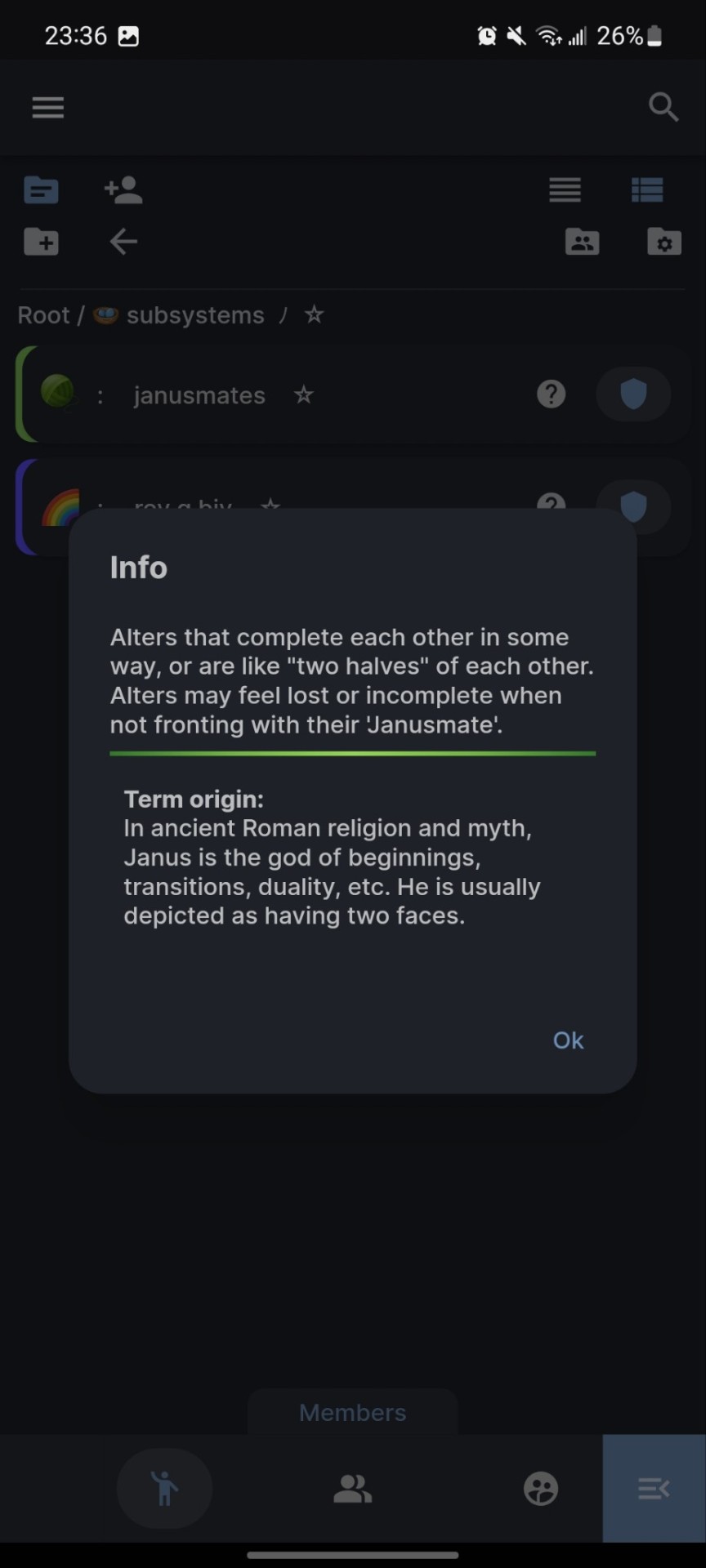

our current custom fields:
* lyric / quote
blank field for a divider or graphic
* bday or forming date
* age
* appearance (verbal description)
* faceclaim (picture)
* other names
* prns & sexuality
* species
blank field for a divider or graphic
* role
* symptoms held
* activity (how often they front)
* complexity (fully formed or not)
* hierarchy
* subsystem
* relationships (internal & external)
* headspace location
blank field for a divider or graphic
* source
* pseudomemories or source memories
* source quotes
blank field for a divider or graphic
* weirdly specific opinions
* likes
* dislikes
* playlist
* irrational fears
* fun facts
blank field for a divider or graphic
* sign off
* fronting triggers
* reviews (that other alters leave about them)
* miscellaneous
* badges (stamps, blinkies, etc)
* credits
other random field ideas:
* mbti or other personality types
* talents & hobbies
* how to tell when the alter is at/near front
* handwriting, typing quirks, etc
* "this" or "that" type questions (cats or dogs, introvert or extrovert etc)
* other titles to refer to the alter as
* associations
* which alters helped fill out the profile
* stereotypical tropes?
* what types of dysphoria the alter experiences (height, gender, voice, etc)
* kins/synpaths
* what they would be bullied for in middleschool /hj
* "life written by: ___" (favorite writer, music artist, etc. basically, "they get me" or saying that their work is very relatable.)
* fursonas, oc's, etc
* how to make the alter feel more comfortable when they're at front, or if you're meeting them for the first time
* neopronoun or xenogender hoards
* what they would most likely be arrested for
* wishlist of things the alter wants to buy?
* if you're into things like danganronpa, then feel free to add a SHSL talent field :3
☆
we don't regularly add anyone on simplyplural, so we don't have that many privacy buckets. however, we do have one for all source related fields (faceclaim, source, mems, quotes, etc).
we also have a privacy bucket for the pronouns and sexuality field in case we ever add anyone we know irl.
for each of our role groups, we always include a definition for the role in the description/info box for those who may not know the term. ^_^
☆
other things we to do make our profiles a little bit more fun:
* silly quotes or references for the bios! we usually do twitter or tumblr references.
* over-use and abuse the description box for the groups. we always leave little notes, jokes, gifs, or extra graphics in ours.
* we have an info page at the top of our alter list where we include basic info about the sys. we also added a basic dictionary of system terms in the custom fields and some userboxes!
* make tons of silly groups. if you're running low on inspiration, check out those sorting memes where characters are put into certain scenario categories (hard to explain, but do you know what i'm talking about?). like... what characters would do in a fire, watching a horror movie, etc.
* also, groups for subcultures‼️
* get people outside of your sys to leave reviews about the alters to add to the "review" field! bonus points of they write it like a professional review or add "__/5 stars".
* we don't read fanfiction, but if you do, i recommend adding a section in the custom fields or groups for a hyper-specific AO3 tag or something!
* don't worry if your account isn't always super aesthetic. seriously, it's okay. your account layout has nothing to do with how valid you are. just make sure you have fun. :p
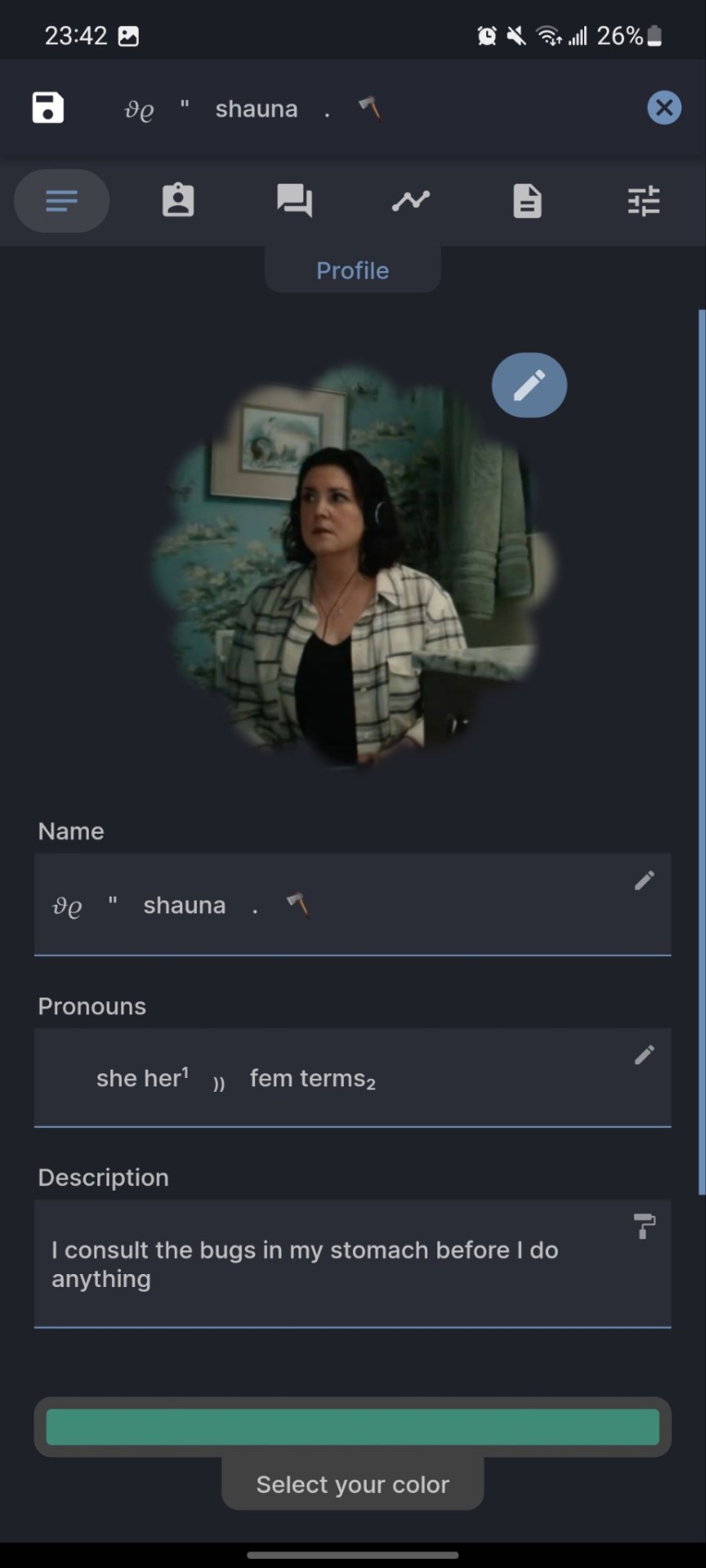
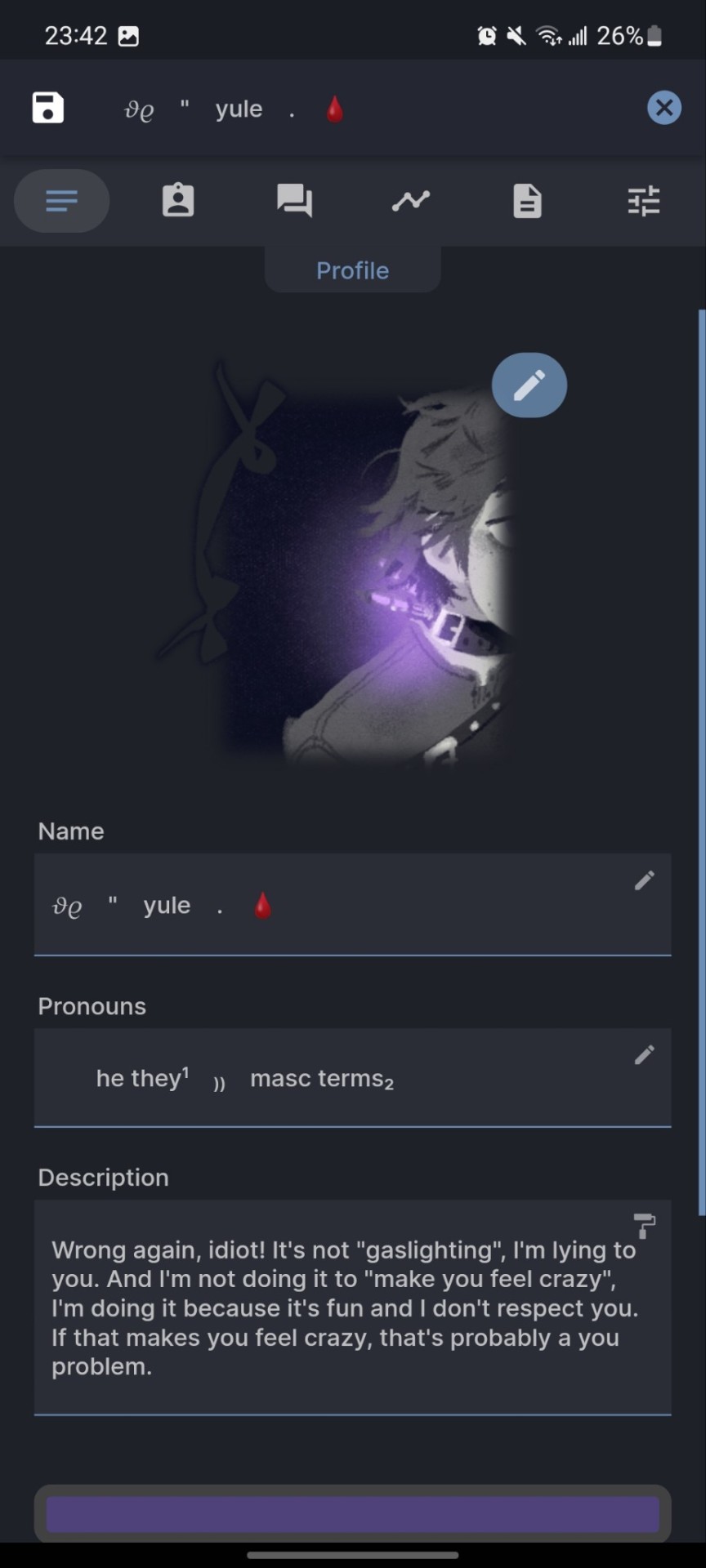
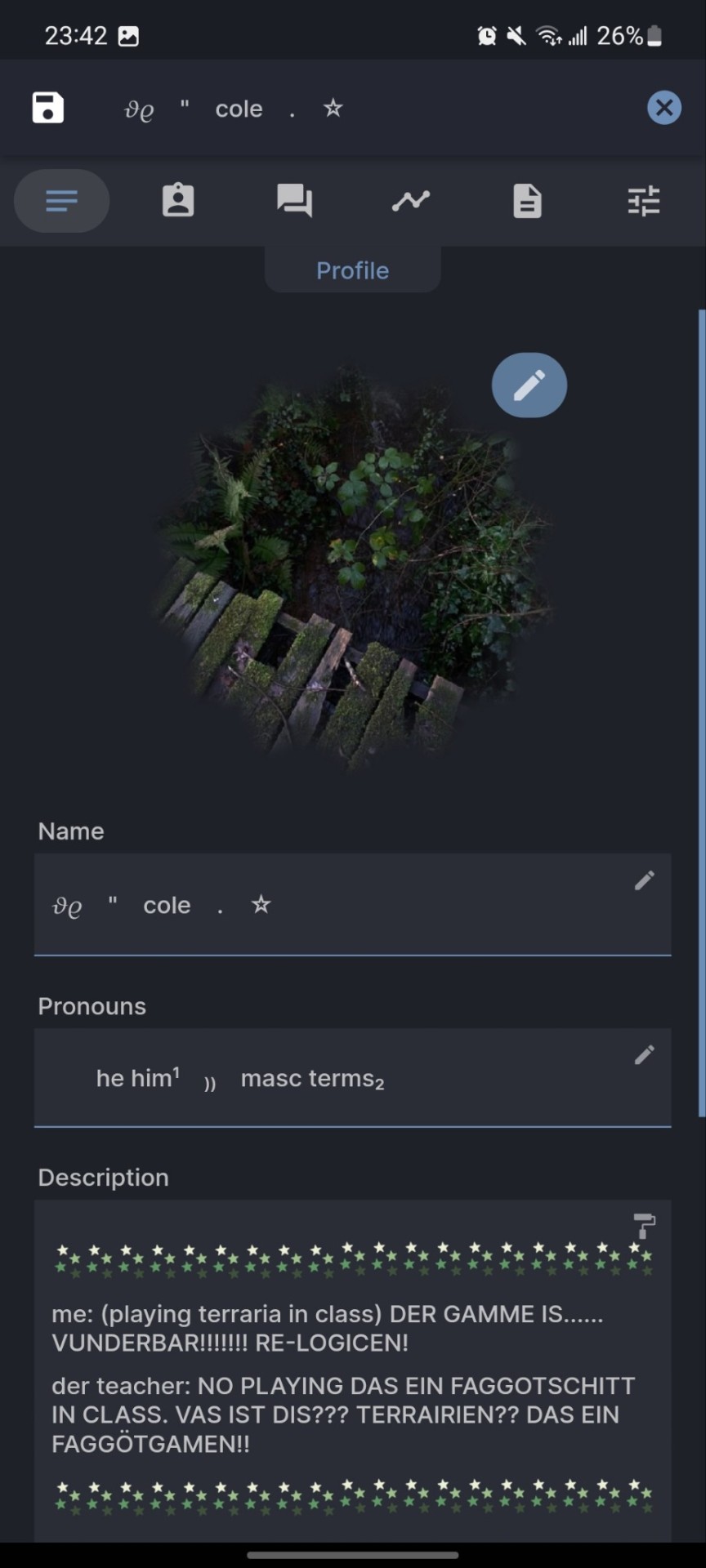
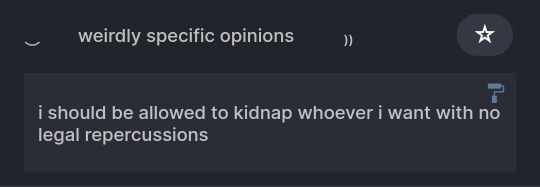
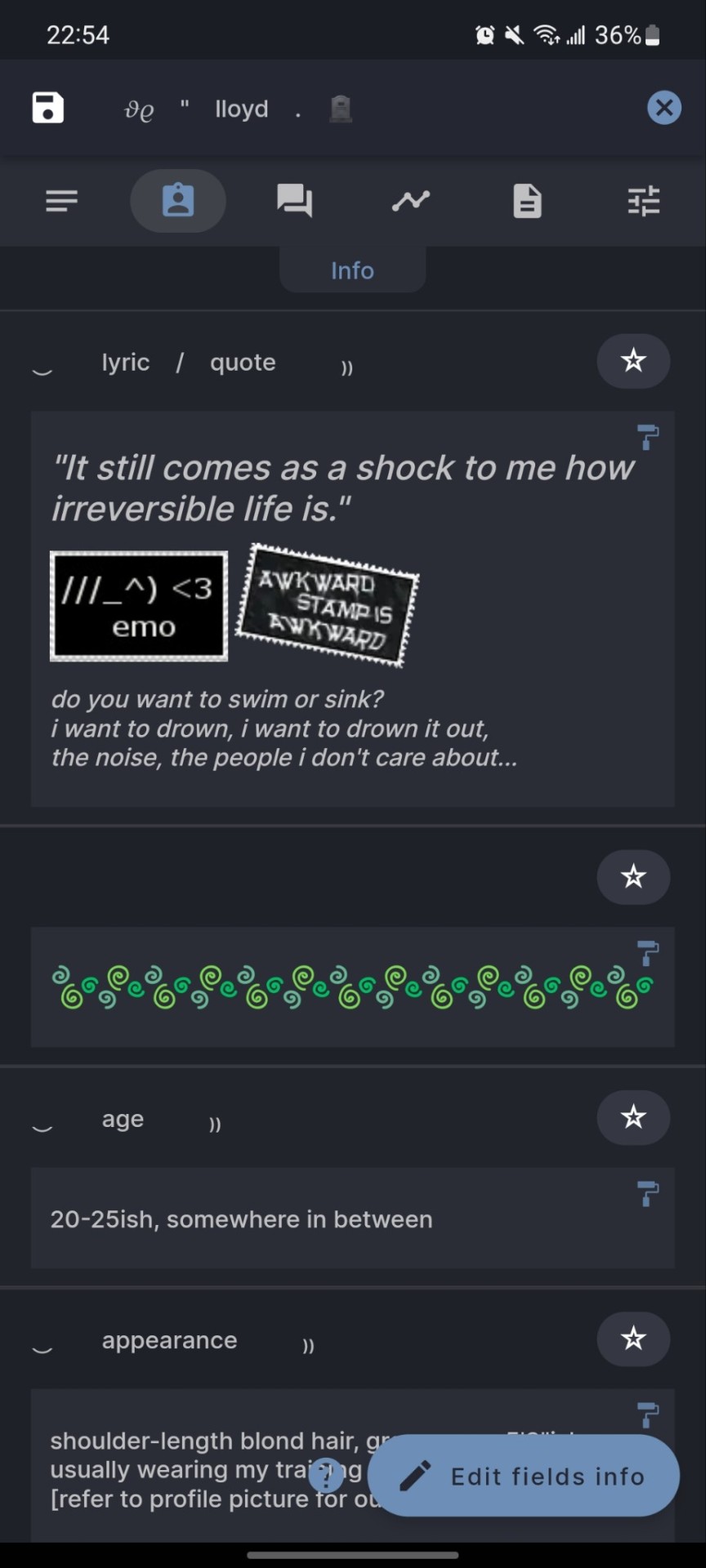
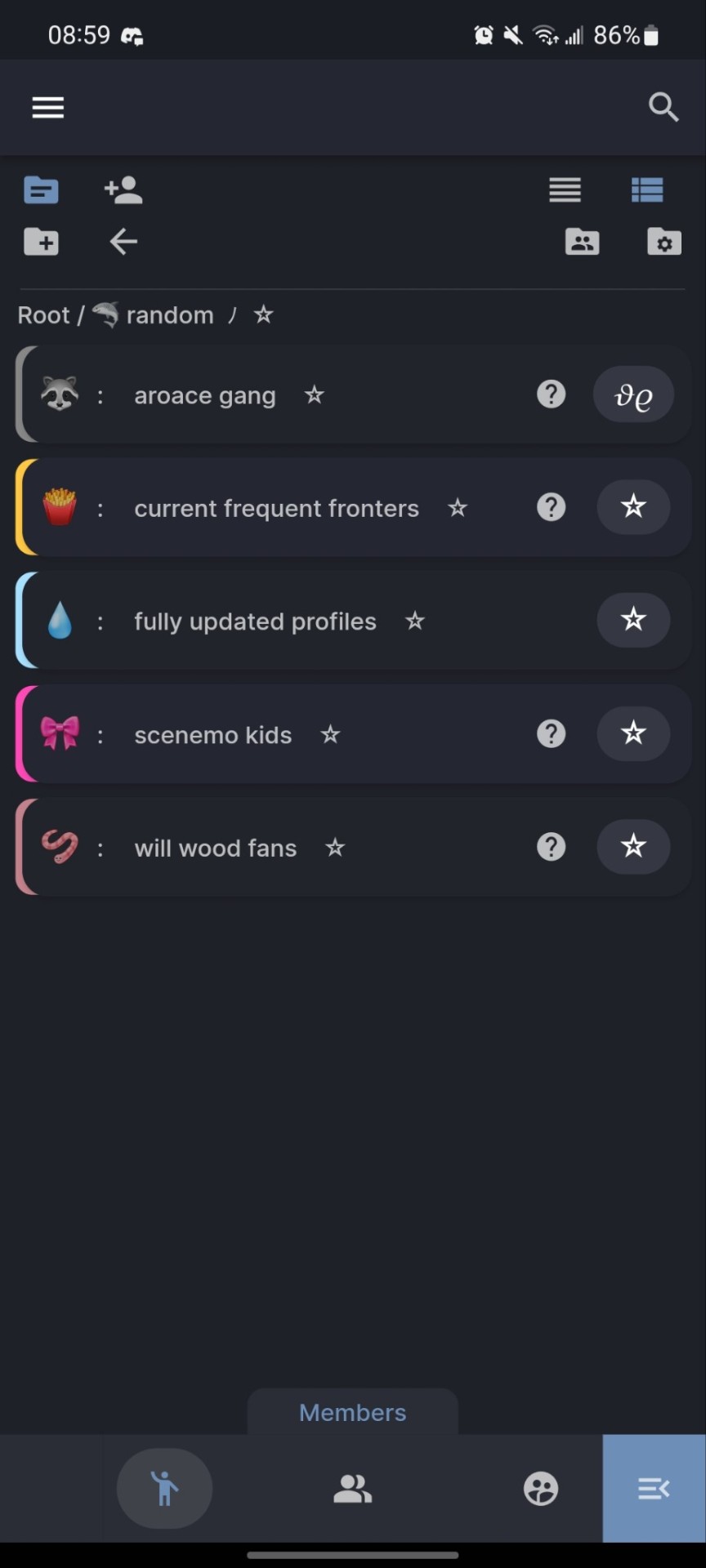
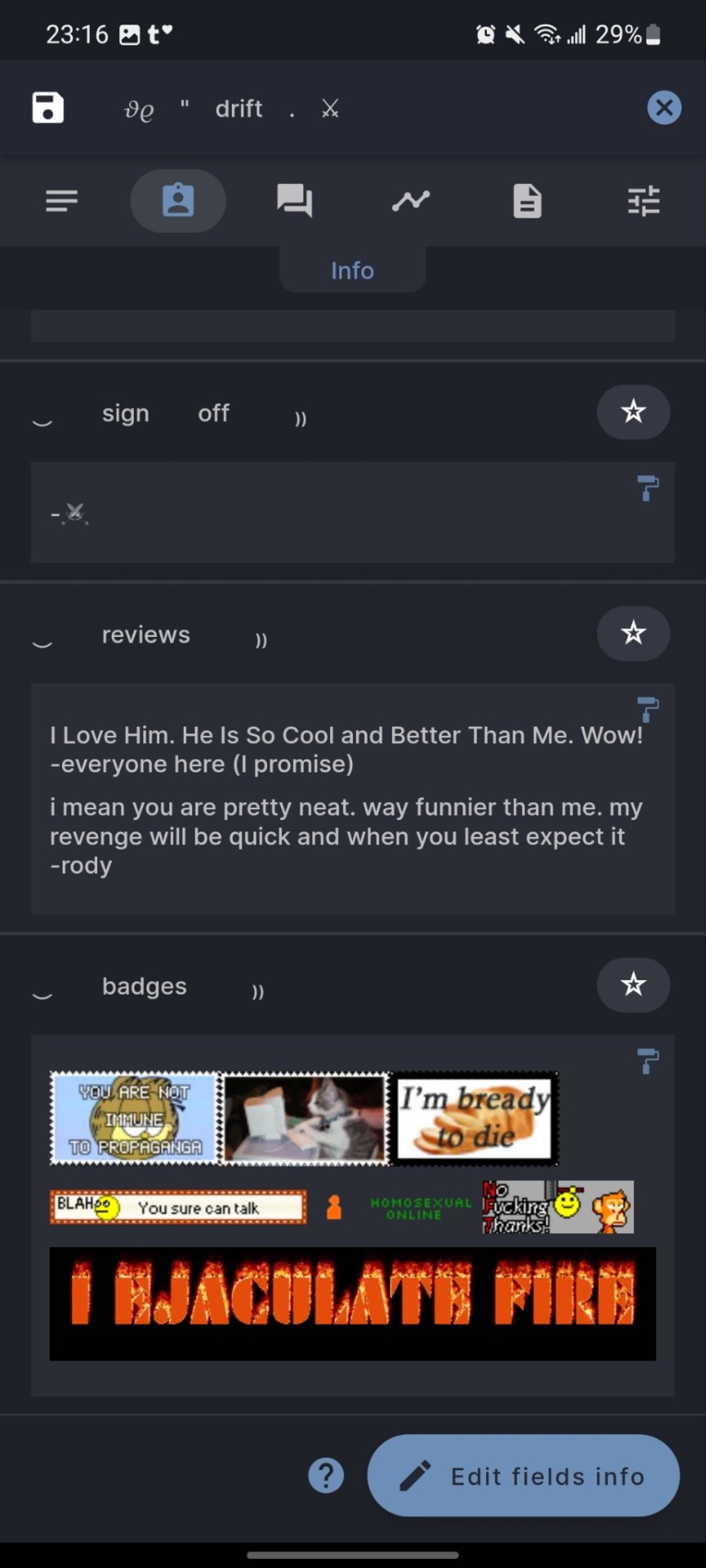
#☆ random#☆ ??? speaks#dissociative identity disorder#actually did#did system#traumagenic did#did osdd#did community#did alter#non traumagenic dni#actually traumagenic#traumagenic system#osddid#osdd#osdd system#actually osdd#dissociative system#actually dissociative#plural system#system stuff#simply plural#simplyplural template#simply plural template#simply plural inspo#pluralkit#pluralkit template#plural kit template#endos fuck off#endos dni#endos do not interact
271 notes
·
View notes
Text
How to make alters comfortable enough to reveal themsleves
I know systems find it hard to have communication with uncontacted or newly revealed alters, so here are some ways to find out about them
(this also helps to tell if an alter is real or if your brain is just playing around)
01﹒don't force an identity on them.
some alters might find it harder to express themselves if other alters fill out their personal information for them, they may prefer to do it themselves
(ex. don't write or say their full name - just use a letter, don't write their pronouns, don't note down their orientation or gender)
02﹒don't neglect their emotions.
focus on what makes them an individual or what they're comfortable with rather than thier identity
(ex. noting their likes and dislikes)
03﹒give them templates or examples.
they may want to communicate with others but may be confused, not know where to start, or are too anxious to do it without any help
basic things such as introduction templates or giving them a place to write down their thoughts can help them learn who they are and how they fit into the system
04﹒keep them seperated if needed.
alters may blend together when fronting so barring suspected new alters from fronting with old ones can help distinguish them
this can also help systems with higher amnesia barriers to stop alters from accidentally hiding other alters
#advice.#not an ask.#did system#osdd system#osddid#osdd#did osdd#did#cdd system#did/osdd#system stuff#actually did#traumagenic system#actually DID#actually traumatized#endos dni#dissociative identity disorder#dissociative system#actually traumagenic#anti endo#non traumagenic dni#system blog#system help#system advice#system#osddid community#osddid system#alter help
587 notes
·
View notes
Text
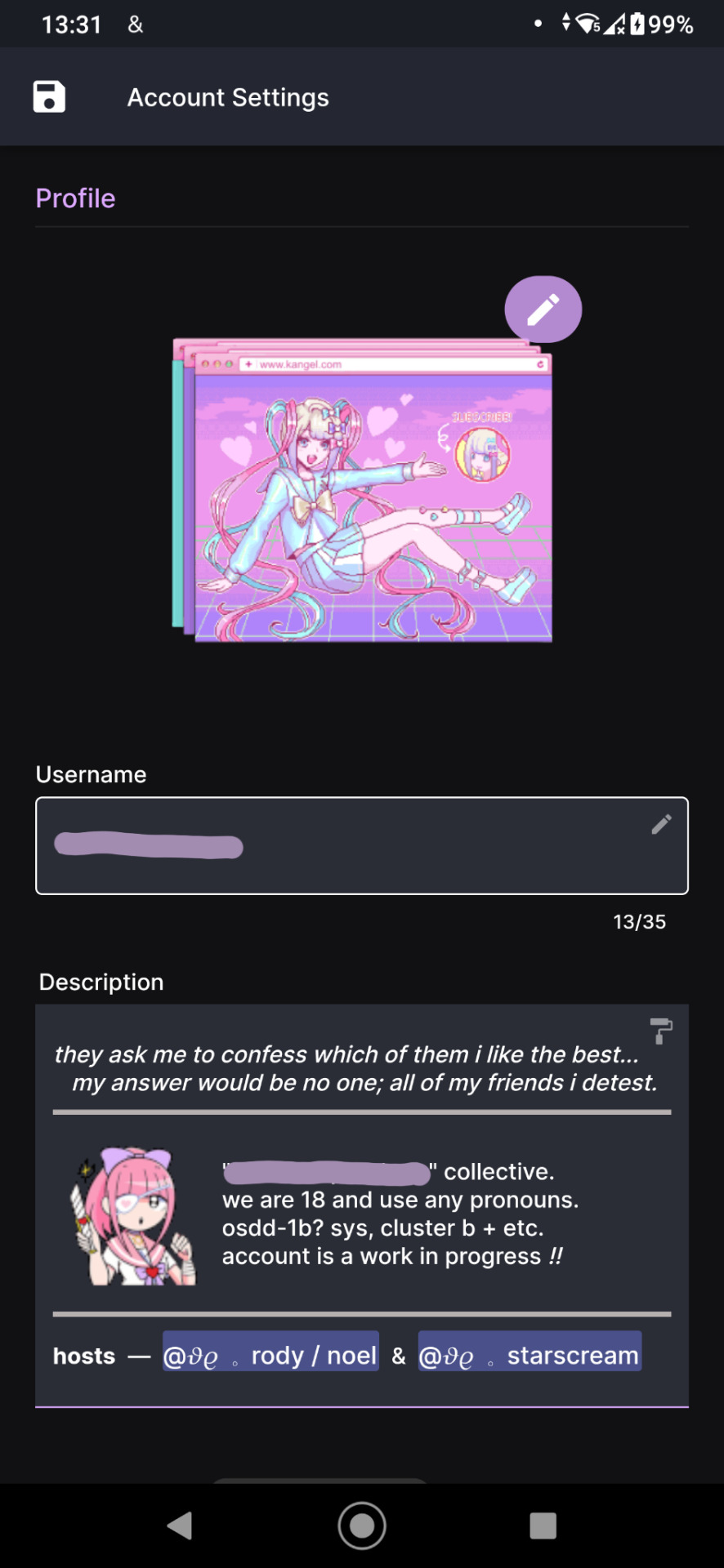

(+pro) endos dni !!
all of the icons are gifs but unfortunately i can't show them here... :(
#dni endos#anti endo#endos dni#non traumagenic dni#anti nontraumagenic#actually did#actually dissociative#did osdd#did system#dissociative identity disorder#dissociative system#osdd#osddid#osdd system#traumagenic system#actually traumagenic#traumagenic did#traumagenic osdd#actually osdd#simply plural template#plural kit template#pluralkit template#simply plural#plural kit#simply plural inspo#simplyplural
611 notes
·
View notes
Text
I really hate seeing others say how they want DID or think it's so cool when they're a singlet cuz why???? Why would you want this??? I genuinely can't comprehend why someone would purposely try to create a system either because this sucks
And don't get me wrong I absolutely love my head mates, I adore Saturn, Astrid and 404 are fucking cool as shit and I love everyone else, even the hurt ones, even our persecutors, but I would give literally anything if it meant I could have my own body away from them, I wish I could be physically detached from Saturn so I could give him actual hugs and kisses, I wish i could go get my own little job maybe at a library or smth simple and quiet, i wish I could look like myself instead of this body.
I just don't understand why anyone would want this
#did system#dissociative system#plural system#sysblr#system#system community#did#cdd#did stuff#cdd system#complex dissociative disorder#dissociative identity disorder#anti endo#anti willogenic#endos dni#anti non traumagenic#system things#system stuff#systempunk#syspunk
430 notes
·
View notes
Text
shout out to all the systems that formed from “unusual” trauma or trauma that's never talked about in this community - being bullied, sibling abuse or abuse from someone that's not your parent, near death experience(s), medical abuse, and anything and everything else
you're all valid. the child's brain is incredibly fragile and everyone is traumatized differently. just because your trauma wasn't from a parent, doesn't make you any less valid.
i wish more people spoke about the other sources of trauma
#actually did#cdid#did#did system#plural system#system#osdd#osdd system#osdd1#osdd 1b#osdd 1#did osdd#usdd#usdd system#usdd : unspecified dissociative disorder#this post is not for non traumagenic systems btw
2K notes
·
View notes
Text
nah. idgaf.
endos and other non traumagenic “systems” aren’t valid. theyre not a system.
they’re a sick freaks pretending to have a serious TRAUMA DISORDER.
you can def be groomed into believing you are an endo or dont have trauma, and in that case. i’ll support you. or if you don’t remember your trauma.
but NOT REMEMBERING YOUR TRAUMA ≠ ENDO. YOU JUST DONT REMEMBER IT. DO NOT LABEL YOURSELF AS NONTRAUMAGENIC LIKE AN IDIOT.
#block me rn#anti endo#endos dni#non traumagenic dni#horrorwood barks#dissociative identity disorder#did system#actually did#traumagenic system
427 notes
·
View notes
Text
Decided to share an experience that we had as we've been dealing with D.I.D or at least acknowledging it.
We discovered our D.I.D around 2020. (I know it sounds like every fakers story but stay and listen)
As we started we thought logging alters was necessary, that keeping track of who's fronting and everything was how you fit in and keep everyone in line. Very quickly we learned that was wrong and practically impossible while still going through abuse.
And we learned thats okay.
Young systems, you don't need to have all these alters written down/logged in simply plural/ told to the whole world.
Instead us young systems should let alters do their job. Trauma is what caused this and trauma and stress is what is going to continue to happen to our small brain. It's okay.
Don't stress it. Let it. You can personally know everyone, and sometimes write about your brain mates. But lets take it slow.
#did osdd#actually did#did community#did system#osddid#osdd#traumagenic system#dissociative system#system stuff#system things#plural system#traumagenic plural#plurality#actually plural#plural community#traumagenic only#traumagenic#traumagenic did#non traumagenic dni#traumagenic community#osdd community#osdd did#ptsd#complex dissociative disorder#actually dissociative#dissociative identity disorder#complex did#c did#c did system#hc did
252 notes
·
View notes
Text
might as well try one of these,,, been struggling with motivation for a while
for every,,
1 note —> I make a new tab on my document for a headmate
5 notes —> I fill it out
10 —> I decorate the whole thing and finish it off
thank you ^-^
update: 4 filled out! 15 tabs made :3
#notes game#note game#pluralgang#plural community#endo safe#traumagenic system#non-disordered traumagenic system
73 notes
·
View notes